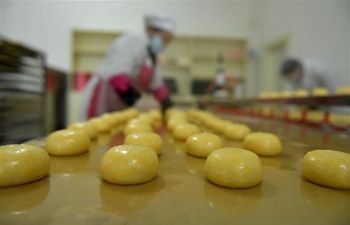HONG KONG, Jan. 10 (Xinhua) -- A novel drug discovered by researchers from the University of Hong Kong was found effective in treating Severe Acute Respiratory Syndrome (SARS), Middle East Respiratory Syndrome (MERS) and A/H1N1 influenza, according to the university which released the results on Thursday.
Respiratory viruses are the most likely emerging virus that can cause huge morbidity, mortality and socioeconomic disruption. The study of these diseases and their pathology showed that coronaviruses often use the lipid membrane synthesis pathway of human host to produce intracellular lipid membrane vesicles as the machinery for producing virus particles, the researchers said.
The identification of a host target which control lipid production can help finding a drug that targets this host target and therefore stops virus replication.
Using integrative transcriptomic and lipidomic analyses, the researchers found that cellular lipid metabolism is profoundly upregulated with MERS coronavirus infection.
Followed by this, a bioactive lipid library was screened and AM580 was identified as a potent and broad-spectrum antiviral with high selectivity indexes in cell lines, and as a safe and effective anti-MERS and anti-influenza treatment in mouse models and human organoids.
The new drug is also found effective in treating SARS and Zika.
Clinical tests are to be done to prove the effectiveness of AM580 in human, according to the researchers.
The finding was published in the leading scientific journal Nature Communications.

















